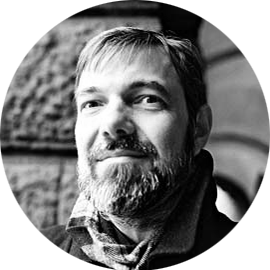
David Eben
Gregorian Chant & Early PolyphonyDavid Eben (born on the 6th of January 1965 in Prague) He is a founder and an art director of the Schola Gregoriana Pragensis ensemble. After graduation from the clarinet studies at Prague’s conservatory in 1986, he took up musicology at Faculty of Arts of Charles University. Since the second form he specialized in medieval music, mainly in Gregorian chant. In 1991 he graduated from Paris conservatory (Conservatoire Nationale Superieur de Musique de Paris), the program Conducting Gregorian Chant, and in the following year he worked as a conductor of the Choeur gregorien de Paris ensemble. Then he also often visited the Solesmes monastery, a centre of research into Gregorian chant, with the view of studying and consulting. Since 1993 he works at the Institute of Musicology of Charles University where he lectures on topics related to Gregorian chant and liturgy (neumatic and choral notation, introduction to Gregorian chant studies, seminar on medieval monody etc.). In September 2008 he became profesor of Gregorian Chant at the University of Lucerne (Switzerland). He regularly tutors in summer courses on theory and practice of Gregorian chant in France (Academie internationale de Sees, Centre de musique polyphonique de Picardie Saint-Valery) and in Switzerland (Festival de Musique Sacre de Fribourg). On a long term basis he has been co-operating with the Czech Radio in creating programs on Gregorian chant (History of the Tone, a cycle Liturgical Year through Gregorian Chant). Besides medieval sacred music he also deals with other music genres. Together with his two brothers he is active in the Eben Brothers Band.
Further information about David Eben can be found at:
About The Class
“Traditio et reformatio” – Tradition, novelty and their reconciliation
This year the class will focus on some of the neuralgic points in the history of liturgical singing. On the basis of selected examples, we will try to present the liturgical repertoire as a living organism that is constantly changing – albeit within certain boundaries. One of the important themes will naturally be the Reformation in our land, which is linked to the influence of the followers of Jan Hus, and which was strongly reflected in musical practice. However, the phenomenon of the Reformation can also be seen in a broader sense: as a process that has accompanied the Church and its music from the very beginning. After all, we are certainly right to speak about the Carolingian reform of liturgical singing in the 8th-9th centuries, or the reform of the repertoire from the workshop of the Cistercian monks.


